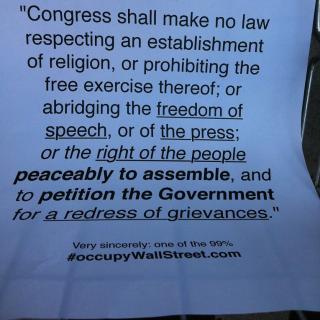Advertisement
COLUMBUS, OHIO (May 11, 2020) - On May 1, 2020, the Columbus City Council chose to flatly deny a citizen group’s request to place the Columbus Community Bill of Rights (CCBOR) charter amendment on the November 2020 ballot. After the coronavirus shutdown froze signature gathering in mid-March, the group had secured almost 9,000 signatures, and so the group asked City Council to vote to place it on the ballot. The current deadline to turn in 9,870 valid signatures is June 18.
In response to COVID-19, the community group made the difficult, yet necessary decision to cease signature gathering on March 12.
Due to a 2014 change to the city charter, local petitions in Columbus (unlike other Ohio cities) are required to collect signatures within a one year window. That means COVID-19 is costing the group valuable time to finish their signature drive.
On April 27 petitioners requested, given the extra-ordinary circumstances, that the Columbus City Council could preserve the process by simply using its power to place the initiative on the ballot. It refused to do so.
According to Section 45 of the Columbus Charter:
What the charter states is that there are two distinct ways for a charter amendment to be placed on the ballot: one by a vote of five of the seven (2/3rds) of the councilmembers and the other by initiative petition by the people. In his email reply to the group, Council President Hardin insisted that City Council could not place a citizen initiative on the ballot that “has not met the signature threshold.” Hardin also asserted that “Council is committed to following the charter.” These are excuses that ignore the Council’s ability to directly place the measure on the ballot.
On May 6, the community group sent an email to the City of Columbus Public Health Director and copied Dr. Amy Acton and Governor DeWine, making their case that the peoples’ democratic right should not fall victim to COVID-19. The ask was for the health commissioners to toll the signature gathering based on authority granted to them during the shelter in place order by the State. Dr. Mysheika Roberts stated in her reply, “We would encourage you to continue working with the legislative branch of city government to explore solutions to your predicament.”
“These are unprecedented times and we have witnessed many unprecedented decisions by government officials in order to protect both public health and democracy during this crisis,” says CCBOR organizer Bill Lyons. “From Governor DeWine canceling of Ohio’s Primary Election on March 17 to closing many businesses and services. We are asking our city council to also protect both the people’s physical health as well as our constitutional and democratic right to propose laws directly to the voters of this city during this time of crisis.”
“What we seek is simply safety precautions and fairness. A failure of government officials to address this issue would be worrisome. It would make a mockery of the initiative process, because it would require the people to ‘choose between their health and exercising their constitutional rights,’” says petitioner Charlotte Owens.
This isn’t the group’s first attempt to place the CCBOR on the ballot to give voters a voice in protecting the city’s water supply and air and soil quality from the harms posed by the disposal of oil/gas waste products in the Columbus watershed. Last year, the group collected over 18,000 signatures for a similar ordinance, passing the signature gathering process, but were kept off the ballot by the Board of Elections and the courts. They also made attempts in 2014 and 2015.
“This was going to be the year we finally made it onto the ballot”, stated CCBOR volunteer Sandy Bolzenius. “No one could have predicted COVID would happen and the voters of Columbus should not be penalized for it either. This charter amendment is about preventing a public health crisis in the future. It’s about protecting our water. We have witnessed communities like Flint and Toledo, who suffered serious harm to their water supplies and it is devastating for a community.”
Carolyn Harding stated “We need everyone to call and write to our City Councilmembers telling them to put the Columbus Community Bill of Rights directly on the ballot. It’s not safe for the initiative process to continue during the pandemic. We all need to demand that our government doesn’t force the people to choose between democracy and public health. We can, and should, have both.”
Columbus City Councilmembers can be reached at:
Shannon G. Hardin, Council President, (614) 645-5291, SGHardin@columbus.gov
Elizabeth Brown, Council President Pro Tempore, (614) 645-7163, ECBrown@columbus.gov
Mitchell J. Brown, (614) 724-4686, MJBrown@columbus.gov
Rob A. Dorans, (614) 645-5829, RADorans@columbus.gov
Shayla D. Favor, (614) 645-5524, SDFavor@columbus.gov
Emmanuel V. Remy, (614) 645-3559, EVRemy@columbus.gov
Priscilla R. Tyson, (614) 645-2932, PRTyson@columbus.gov
###
Background Information on the CCBOR amendment “To Establish a Community Bill of Rights for Water, Air, and Soil Protection and to Prohibit Fossil Fuel Extraction and Related Activities and Projects.” (See link to full text of petition below.)
Link to full text of the Columbus Community Bill of Rights petition: https://columbusbillofrights.org/wp-content/uploads/2019/06/2019-Columbus-Charter-Amend- PETITION-8-pg-1.pdf
Further information:
https://columbusbillofrights.org
https://www.facebook.com/ColumbusBillofRights/



